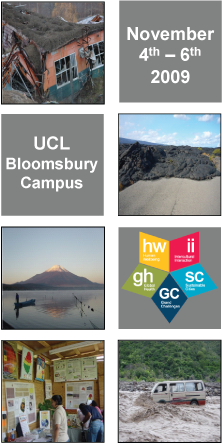|
|
|
|
|
Sessions
There were five sessions over the two and a half days. Each session ended with an extended discussion. In addition to oral presentations there were posters on display throughout the conference. The meeting was opened by a session of invited keynote talks, which introduced the fundamental concepts of Disaster Risk Reduction (DRR), identify directions for future research and provided a framework for the open sessions that followed. Click here for copies of the presentations
and abstracts. The United Nations defines DRR as ‘the concept and practice of reducing disaster risks through systematic efforts to analyse and manage the causal factors of disasters, including through reduced exposure to hazards, lessened vulnerability of people and property, wise management of land and the environment, and improved preparedness for adverse events’. We will explore this concept and examine how it works in practice, particularly the application of knowledge acquired from hazard research. These topics will be investigated by invited DRR experts and practitioners, who will also define some of the key knowledge gaps that could be used to establish an agenda for future research.
The capacity to map, monitor and model hazardous natural processes is essential for developing reliable forecasts and early warnings, and underpins Priority 2 in the Hyogo Framework for Action. Although there have been significant developments in these aspects of hazard science, a high degree of uncertainty remains in quantifying complex natural hazards. We invite presentations that showcase recent advances in hazard science and their practical application to DRR. We also encourage contributions that evaluate uncertainty and consider how it is communicated.
Vulnerability, resilience and capacity building are key components to understanding the circumstances that make vulnerable citizens more likely to suffer a significant loss. To provide an integrated approach all three of these elements must be assessed together, although in practice the focus remains largely on vulnerability. We invite papers that describe state-of-the-art research in evaluating vulnerability, resilience, and capacity building, utilising qualitative and quantitative methods and at local and global scales.
People have been living with disasters for hundreds, even thousands of years. As a result many communities have learned to adapt to the threats posed by natural hazards and, in some cases, the hazards have even become part of the culture. In order for DRR to be effective, it is vital that community perceptions and indigenous knowledge are understood. How a community perceives risk may be vastly different from the views of an outsider. We invite papers that describe strategies for tapping into indigenous knowledge and perceptions and how this helps guide effective approaches for reducing risk. Contributions may also explore the effectiveness of education campaigns in improving risk perception and reducing risk.
Poor communication can render meaningless decisions made by scientists, stakeholders and responsible state agencies. Even so, DRR studies only rarely evaluate the effectiveness of communication. This session invites papers that discuss: methods of communication within and between groups in the DRR community; the role of decision making tools, warnings and alert systems; and the increasing use of technology in communication. We also welcome contributions on how communication is optimised under different economic, cultural and political constraints. |
 |
|||




